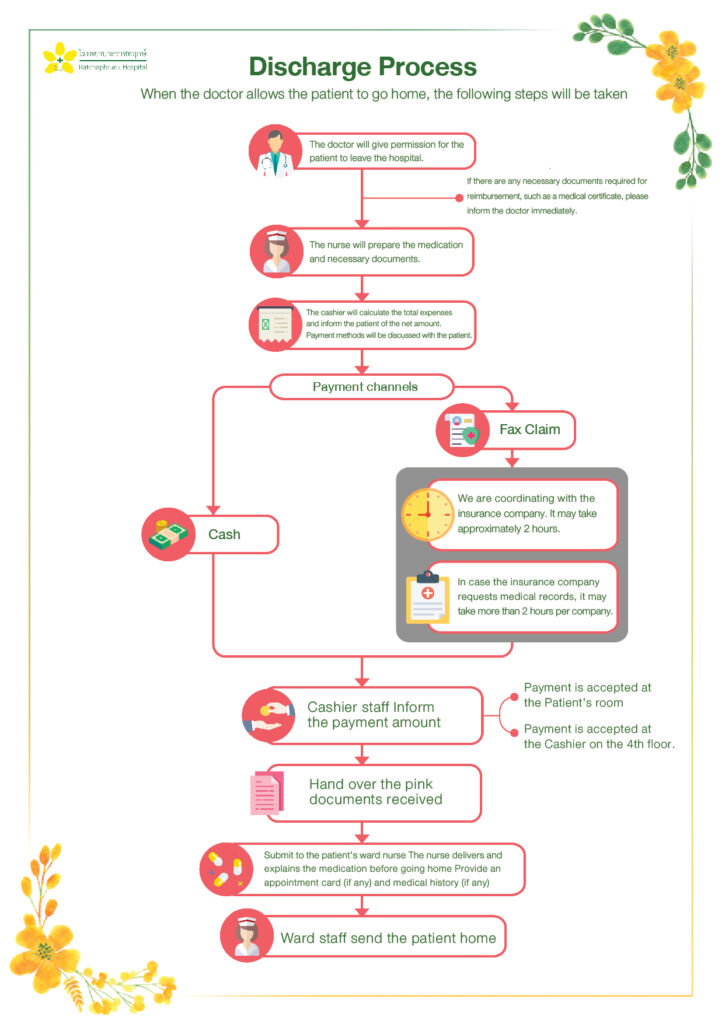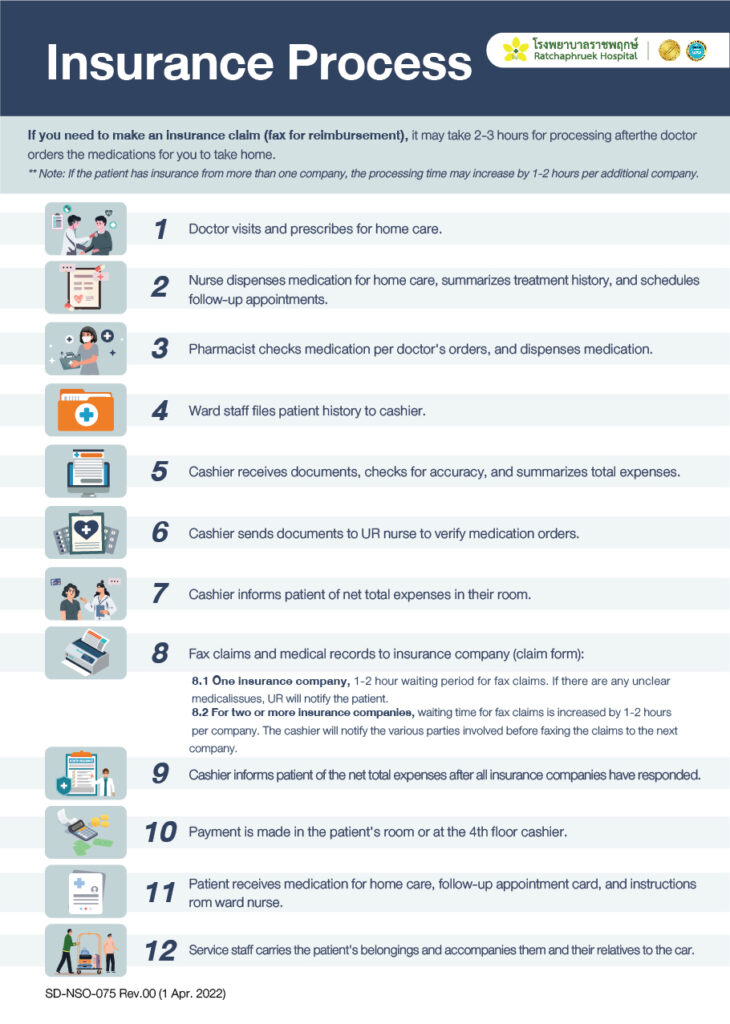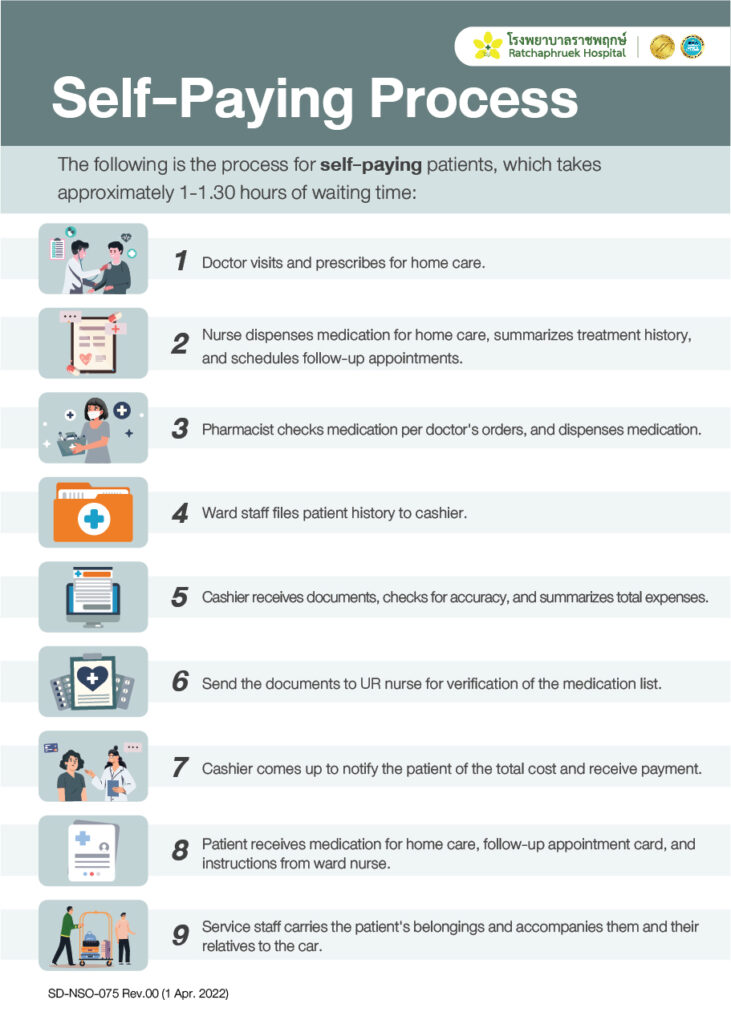Discharge Plan
At Ratchaphruek Hospital, patients will be first assessed by physicians before written discharge orders are issued. To ensure that you are ready for the discharge process, the written discharge order must be recorded and filed in your medical records prior to the discharge.
Hospital Discharge Planning
Nurses and doctors prepare the discharge procedures one day in advance as follows:
1 The doctor visits the patient and prepares for pre-discharge.
● Write a summary of medical treatment
● Write a medical certificate
● Assess the patient
● Write an insurance claim
● Order home medication
2 The nurse informs the patient and their relatives about the discharge plan on the day before to let them prepare for going home.
3 The nurse informs the doctors who attended the assessment for pre-discharge.
4 The nurse receives the doctor’s treatment orders according to the procedures for receiving the treatment orders. (WI-IPD-004)
5 The nurse prepares home medication and brings them to the patient the next morning.
6 The nurse checks the home medication list and the amount of medication that the patient received from the Pharmacy department.
7 In case of returning medication, the nurse counts the pills, records the number of pills and records the return medication in a computer system before returning the pills to the Pharmacy Department.
The nurse and doctor prepare for the discharge procedures on the day of discharge as follows:
●The doctor visits the patient and assesses the patient’s symptoms and readiness for returning home.
●The nurse performs the following tasks:
●In the case of additional medication, the nurse receives the doctor’s treatment order in accordance with the procedure for receiving treatment orders (WI-IPD-004) to prepare additional medications to the patient.
●In case the patient has insurance, the nurse must submit insurance claims for the patient.
If the patient has just purchased insurance not over 180 days, the fax claim service cannot be used.
The finance department staff will advise the patient to pay in advance and make a reimbursement.
In case of having multiple insurance policies, the patient must be informed that there may be a delay.
●In the case the patient keep their valuable items with the hospital, the staff will coordinate with the
Finance Department to return them to the patient.
●The total expenses bill will be completed by faxing the expenses to the Inpatient Department.
The staff brings a copy of the details of medical expenses to the patient and asks if the patient would like our financial officer come to pick up the payment at the room or their relatives to pay at the Inpatient Finance Department. The staff is not allowed to receive the money to pay on behalf of the patient.
●When the payment is complete, the patient shows the receipt to the nurse, the nurse will explain the medication and deliver to the patient or their relatives (In case of high risk drug. HAD or complicated drug usage including the inhaler, inform the pharmacist to explain and deliver the medication directly to the patient or their relatives. If the pharmacist is unable to come up, the nurse will coordinate with the pharmacist to explain medications via video call to patients and relatives.)
●Call a hospital porter to pick up the patient.
●Check the equipment and supplies along with the patient and relatives according to the Check list
form: the use of the patient’s room and the preparation of the room (WI-IPD-005) to ensure that no equipment or belongings remain in the room.
●The staff brings the patient to the hospital gate and say, ‘Good luck, I wish you healthy.’
Patients are not allowed to walk on their own. In the event that the patient refuses the wheelchair, the porter will push the wheelchair along with the patient, so if an emergency happens, assistance will be provided immediately.
General self-pay takes 90 minutes.
Health insurance claim takes 120 minutes.
Overseas insurance claim must be managed 1 day in advance.
TRANSPORTATION ARRANGEMENTS
1.The nurse will call a hospital porter to pick up the patient.
2.The nurse will check the equipment and supplies along with the patient and relatives according to the Check list form: the use of the patient’s room and the preparation of the room to ensure that no equipment or belongings remain in the room.
3.The nurse together with the preferred translator will bring the patient to the hospital gate.
Patients are not allowed to walk on their own.
4.In the event that the patient refuses the wheelchair, the porter will push the wheelchair along with
the patient, so if an emergency happens, assistance will be provided immediately.



Traveling by Air
If you need to travel by air to return to your home country or another travel destination, you will need to ask your doctor to certify a Fit for Travel Medical Certificate, as well as a list of medications you will require abroad. The Fit for Travel Medical Certificate is only valid for three days from the date of issue. Please ensure the following before making travel plans:
- Ask your physician for a summary of medical reports, lab tests and X-ray results
- Gather the contact information of your clinic, transport provider and patient assistant
- Inform your physician and nurse where your destination is
- Confirm transportation plans at the airport in the destination you are headed to.
Against Medical Advice
Patients and Medical travel patients who refuse all types of diagnostic, treatment both inpatient and outpatient; Patients and Medical travel patients have to follow the hospital policy by signing “Consent: Against Medical Advice”
Home Medication Advice and Educational Resources
It is important to understand the educational resources and recommendations that your doctor gives you at the discharge. The following list includes some of the important takeaways at discharge. Please do not hesitate to contact your doctor if you have any questions.
At discharge, patients will:
Be informed and educated about the drugs and medication that they have been given.
Be taught how to manage and adapt to the environment so that it does not affect their health condition; how to utilize community resources and deal with the economic and social problems which may affect their condition.
Understand the goal of treatment, learn how to observe their own symptoms and know when to notify the physician or nurse about significant symptoms. Patients will have sufficient knowledge to handle any emergency situations by themselves appropriately before arriving at a hospital.
Understand their own health status such as limitations and effect from their medical condition. Patients will be able to handle daily activities, cope with the health limitation, aid recovery and prevent complications from happening.
Understand and realize the importance of follow-up appointments. Patients should understand the need to ask for help in the case of emergency, as well as the treatment outcome and treatment plan to the other units which may be applicable.
Have the know-how in selecting nutritional food that is best for their health condition.
If treatment must be continued at another healthcare facility, patients will discharge and leave with a summary of the given treatment at Ratchaphruek Hospital. This summary report will be issued by a physician and given to the patient by a nurse at discharge.
IPAP
Pre-arrival
- Healthcare at Ratchaphruek Hospital
- Safety and Security
- Immigration and Customs
- The Entry into Thailand
- Travel Advice and Support
- Travel Checklist
- Patient’s Rights and Patient’s Responsibilities
- Special Announcement
- Safety Protocol (Infographics)
- Package for Medical Travel
- Telemedicine
- Accredited Standard & Awards
Arrival
- Ratchaphruek Airport Representative
- Meet and Greet at Khon Kaen airport
- Map to Ratchaphruek Hospital
- Safe and clean
Admission
Departure
- Pre-Discharge Plan
- Discharge Plan
- Follow Up
- Transportation Arrangements
 English
English  Tel. (+66) 4333 3555
Tel. (+66) 4333 3555 Hotline (+66) 8 3666 7788
Hotline (+66) 8 3666 7788